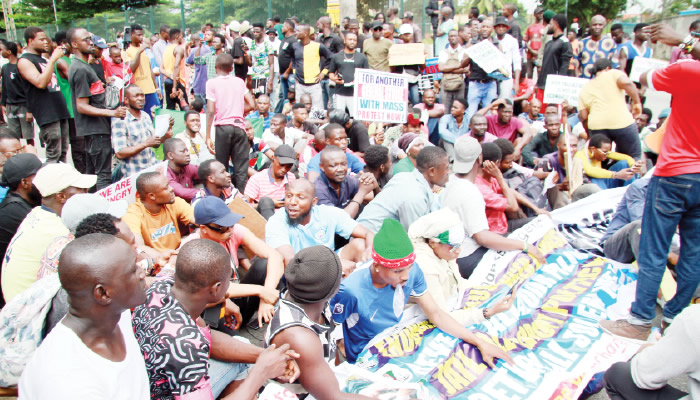
As the ‘End Bad Governance’ protests gain momentum, sparking reports of citizen casualties, LAOLU AFOLABI explores the history of protests in Nigeria, from the seminal Aba Women’s Riot to the recent #EndSARS movement, shedding light on their economic impact and catalytic role in policy changes.
The nation awoke to widespread protests on Thursday as simmering anger and discontent among Nigerians erupted. The reasons behind the planned demonstrations are myriad, encompassing economic struggles, governmental malfeasance, and perceived leadership ineffectiveness. Alongside economic challenges, entrenched corruption at various government echelons has eroded public trust, leaving citizens disenchanted with leaders seen as prioritizing self-enrichment over public welfare.
President Bola Tinubu’s administration, inaugurated on May 29, 2023, was greeted with high expectations for change and relief from the burdens of the previous government led by Major-General Muhammadu Buhari (retd.). However, the administration’s swift removal of petrol subsidies, despite promises of relief, exacerbated economic hardships, leading to soaring prices and financial strains for many, fueling discontent and dissent.
The current protests are a response not only to immediate economic crises but also to longstanding grievances, including police brutality, poor public services, and infrastructural deficiencies that have festered over the years. Movements like #EndSARS in 2020 underscore the enduring demands for justice and systemic reforms.
Protests have been pivotal in Nigeria’s narrative, reflecting the nation’s eclectic social, political, and economic challenges. From the historic Aba Women’s Riot of 1929 to the Naira Redesign protest of 2023, Nigerians have exhibited resilience in advocating for their rights and a brighter future in the face of adversity.
The Aba Women’s Riot in December 1929 marked a significant revolt by women in southeastern Nigeria against British colonial rule, protesting unjust taxes and oppressive policies. Approximately 50 women lost their lives in the struggle, with many others enduring assaults.
In November 1947, the Abeokuta Women’s Revolt saw another notable protest in the current capital of Ogun State, as women stood against colonial and local authorities over oppressive tax policies. Noteworthy figures like Funmilayo Ransome-Kuti, mother of music icon Fela Anikulapo-Kuti, led these earlier movements.
In April 1978, the ‘Ali Must Go’ protests, spearheaded by youths, erupted against a tuition hike reportedly orchestrated by then-Minister of Education, Col. Ahmadu Ali. The protests escalated, resulting in clashes with security forces and tragic student casualties, forcing the closure of universities amid widespread unrest.
May 24, 1989, witnessed protests against the Structural Adjustment Programme introduced by the Ibrahim Babangida regime, triggering nationwide dissent against mounting economic burdens. The unrest led to government measures aimed at assuaging public grievances, including job creation, relief packages, and policy reversals.
In 1993, massive protests erupted following the annulment of the presidential election, culminating in political turmoil and eventual democratic transition in 1999 amidst widespread discontent.
On January 2, 2012, the ‘Occupy Nigeria’ protests commenced, reflecting societal frustrations and political dissent.
The fuel subsidy removal by the Federal Government under ex-President Goodluck Jonathan on January 1, 2012, came as a sudden shock to the citizens. The decision was announced without prior warning, leading to widespread protests spearheaded by Occupy Nigeria organizers starting on January 2. The justification given by the government for the subsidy removal was to redirect funds to essential public services like health and infrastructure and to boost the economy by liberalizing the fuel industry.
Following the removal of the subsidy, the price of petrol skyrocketed from N65 per litre to N141, resulting in a rapid increase in consumer prices. This led to doubled bus fares and a surge in food prices, severely impacting the populace. Protests erupted in major cities like Lagos, Abuja, and Kano on January 2, with demonstrations disrupting economic activities in cities like Lagos, Ibadan, and Kano by January 6.
The protests, which saw the participation of prominent Nigerians, human rights activists, and opposition figures, escalated as the Nigeria Labour Congress and Trade Union Congress called for a national strike from January 9. This strike received support from various organizations, leading to a widespread halt in oil and gas operations as security forces clashed with protesters, resulting in fatalities.
Under mounting pressure, President Jonathan announced measures to alleviate the situation, including the formation of a panel to manage funds freed up by the subsidy removal, a 25% reduction in government salaries, and increased transportation options to lower costs. Eventually, on January 16, Jonathan partially reinstated the fuel subsidy, reducing the fuel price to N97 per litre, though still higher than the original N65.
The #EndSARS protest that gained momentum in October 2020 was a significant movement against police brutality and systemic corruption, culminating in demands for justice, police reform, and good governance. The protests, predominantly led by young Nigerians and supported by activists and celebrities, gained global attention, resulting in the dissolution of the Special Anti-Robbery Squad by the Nigerian Police Force. Despite announcements of reform, protests continued due to concerns over accountability and government responsiveness.
The protests eventually confronted violent crackdowns, culminating in the tragic events at the Lekki Toll Gate on October 20, where peaceful protesters faced brutal force, sparking outrage and further unrest. This dramatic turn of events highlighted ongoing societal grievances and amplified calls for change and accountability.
Echoing the economic hardship experienced after the 2012 subsidy removal, Nigerians expressed their grievances over the current economic challenges, prompting plans for protests against bad governance and economic mismanagement.
As the government intensified efforts to thwart the planned protests, several economic initiatives were rolled out, including the reduction in rice prices, crude oil sales in local currency, and an increase in the national minimum wage. These measures, aimed at addressing economic concerns and fostering stability, were met with mixed reactions and uncertainties regarding their impact on the broader socio-political landscape.
